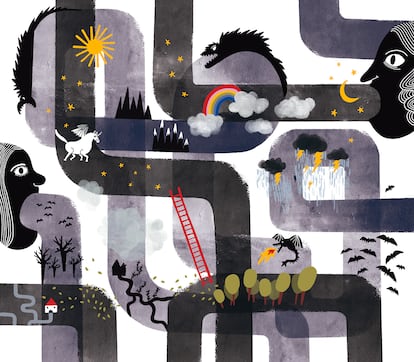Narrative identity: Building who we are
The messages we feed ourselves have the power to heal old wounds and give us a better self-image

I’m nothing but a burden on the people around me; I’ve never been good at relationships; I’m useless when it comes to getting jobs. The narrative we tell ourselves builds our narrative identity – a concept coined by Chicago’s Northwestern University psychologist Dan McAdams. Reality as it is felt can be interpreted as threatening, hopeful or neutral, but there is also reality as it is told through language.
In his research, McAdams asked subjects to reflect on their life history, beliefs and values and found that, despite having lived through similar events, some people told redemptive stories while others told tales of contamination. Narratives focusing on how they coped helped the narrator feel more in control than stories highlighting the opposite. The impact of how each story was told either drove or inhibited wish-fulfillment behaviors. Whether the story was told more optimistically or pessimistically also appeared to influence the likelihood of maintaining that narrative in the future.
Each narrative identity contains characters that are more or less likeable, problems that are either overwhelming or overcome. As McAdams puts it, people make their narrative choices by accentuating certain elements of their story and ignoring others. Typically, events or experiences are chosen to make the most sense of what happened. This narrative identity helps people understand themselves and helps others understand them better; it is, in effect, their calling card. According to French thinker Paul Ricoeur, recounting the main events of something which has just happened to us in a certain order gives us our sense of who we are. But this narrative identity is not something fixed. It is mobile and dynamic, since it is also shaped by external narratives.
Within a therapeutic context, mental health professionals gain access to patients’ experiences through the stories they share with them. So-called narrative therapy, created in the 1970s and 1980s by social workers Michael White and David Epson, aims to find ways to open up contamination-saturated stories in order to interpret them differently. This is accomplished by asking questions that will add details initially absent from the story – either hidden achievements, or times when a certain problem may not have had such a strong impact. This reconstruction exercise is emotional. Memory is not a simple data warehouse. Therapy means taking time to look at the damage done or suffered by validating the associated emotions. But it also involves remembering what was done well, appreciating the tenacity, dedication or effort involved, even when the result was disappointing.
Stories can be rewritten to be more constructive, enriched with new ideas and reflections, thereby helping build a different identity. The new narrative strengthens self-esteem, and it can serve as departure point for healing or forgiving ourselves as well as distancing ourselves from the past. When one tells one’s life in a different way, it can offer new perspective on ourselves.
Psychotherapy is at times comparable to penning an autobiography. There is evidence that the authors’ view of the characters alters as the story progresses. In his book The Ratline, UK writer Philippe Sands tries to change the impression he has of the son of a Nazi bigwig as he discovers new information, with varying degrees of success. In other words, in order to change our narrative we need to examine not only our actions and motives but also those of others.
One way to practice narrative therapy can be to familiarize ourselves with our internal dialogue, paying attention to the type of thoughts we have and analyzing whether they are destructive or constructive. Once examined, we can change our self-image by feeding in more positive messages.
Being the author of our lives depends on many external circumstances, but the way we tell it is always up to us.
Sign up for our weekly newsletter to get more English-language news coverage from EL PAÍS USA Edition
Tu suscripción se está usando en otro dispositivo
¿Quieres añadir otro usuario a tu suscripción?
Si continúas leyendo en este dispositivo, no se podrá leer en el otro.
FlechaTu suscripción se está usando en otro dispositivo y solo puedes acceder a EL PAÍS desde un dispositivo a la vez.
Si quieres compartir tu cuenta, cambia tu suscripción a la modalidad Premium, así podrás añadir otro usuario. Cada uno accederá con su propia cuenta de email, lo que os permitirá personalizar vuestra experiencia en EL PAÍS.
¿Tienes una suscripción de empresa? Accede aquí para contratar más cuentas.
En el caso de no saber quién está usando tu cuenta, te recomendamos cambiar tu contraseña aquí.
Si decides continuar compartiendo tu cuenta, este mensaje se mostrará en tu dispositivo y en el de la otra persona que está usando tu cuenta de forma indefinida, afectando a tu experiencia de lectura. Puedes consultar aquí los términos y condiciones de la suscripción digital.








































